Ready for Life Academy promotes inclusive learning at Calvin College
All photos courtesy of Ready for Life
Some of the students a part of the Ready for Life program pose outside of Calvin’s chapel
Calvin College has partnered with the Ready for Life (RFL) Academy since January 2017 to provide students with special needs the opportunity to participate in college courses and activities after high school as well as prepare them for life after college.
This program values “inclusion (belong), autonomy (believe), and independence (become),” according to the RFL Academy website, as each aspect is one of the fundamental steps for helping their students become independent after graduation from the program. RFL’s mission is to academically challenge, build relationships and help prepare students with disabilities for a life of independence.
RFL is currently in place at both Calvin College and Hope College.
“The goal [of RFL at Calvin] was to have a place for students with disabilities to have the opportunity to go to college (in their own capacity) like many of their peers from high school,” RFL instructor Amber Gilliland said. Another goal is for Calvin RFL students to secure a paid job and live independently after graduation from the program.
The RFL Academy is a four-year transition program for students with special needs between the ages of 18 and 26. RFL has many different features, including participation in college classes and campus activities with same age peers, instruction in core areas of transition and a lifelong learning model based on a student’s desired goals.
For each student, they look at their needs and goals to build a lifelong learning model that is dedicated to “encouraging strong work skills, cultivating gift-based character and fostering independent community,” according to the RFL Pamphlet for Calvin College.
They also promote inclusion, healthy living habits and practices as well as the students’ worth and value. This program has funding partners for tuition and aid from the Ready for Life Scholarship fund. Calvin also provides a classroom for the program in Hiemenga Hall, which serves as their learning lab and office space.
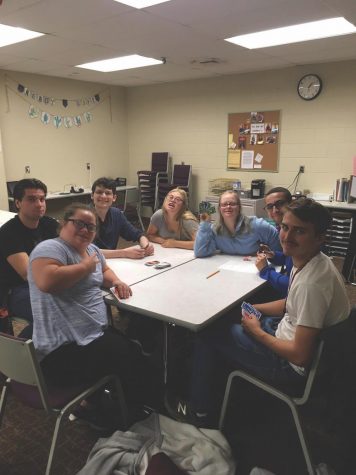
Students playing Uno with the Ready for Life program
In order for a student to be eligible to attend RFL, they must have a diagnosed special need, a high school diploma or certificate of completion, future goals to live independently and have a paying job, as well as various skills which are assessed during an interview.
While participating in the program, students attend RFL-specific classes and Calvin courses. RFL students in Calvin courses do not receive a grade but are active participants in the course, similar to auditing.
Many students attend two courses: one academic such as educational science, adolescent literature, or women’s health and one with a social emphasis such as a cardio class, spinning or a jazz dance class.
Since the start of the program, the students have attended 14 different Calvin classes, taught by 12 different Calvin professors. The students are able to learn, grow and engage with other Calvin students and professors.
These courses have allowed RFL students to become a part of the classroom community, and they look forward to attending their Calvin courses.
“I get to be with nice friends and I am a part of the [Calvin] class,” said senior Joshua Pitman.
Another RFL student, junior Katie Hill, said she really enjoys the program and she “loves her classes.”
Participation in Calvin courses also creates an environment of positive growth and encouragement as it helps to break down stereotypes for people with various disabilities.
Each RFL student’s schedule is different due to the variance in Calvin courses. When they are not at their Calvin class, they are in the RFL classroom in Hiemenga Hall learning life skills. Students meet Monday through Friday from 8:30 a.m. to 2:30 p.m. to learn about and practice various life skills.
The students learn about topics such as budgeting, relationships and job skills that will help them achieve their goals for independence and having a paid job after graduation. From the skills and tools learned in these courses, students are able to pursue and achieve their goals toward independence that previously would have been very difficult to achieve.
“It is far in the future, but I want to be a professional public speaker and educator for people with or without special needs or a professional choreographer. I also want to live on my own after graduation,” said freshman Katie Kauffman.
Junior Jonathan Booza also said he “wants to go and get a degree at another school, possibly in philosophy or psychology.”
While the RFL students are not Calvin students, they are given similar opportunities and services that other Calvin students receive. Each RFL student has a student ID card which can give them access to access to library computers and to a meal plan to enjoy meals in the dining halls with friends. They are also given student rates for various extracurricular activities.
As many of the RFL students want to participate in the same activities as their peers, provision of these services with the program also helps to foster a sense of community, a feeling of inclusion as a part of a typical Calvin student’s college experience, but also an understanding of diversity in the kingdom of God.
In order for RFL Academy to run on campus, there are numerous faculty, staff, and students on board. Gilliland is the RFL classroom instructor with one classroom aide named Jamie.
The program also has an on-campus liaison, James Rooks. Others include all of the professors that “welcome my students to be a ‘guest’ in their class and my many student volunteers who we call mentors,” said Gilliland.
Currently, there are about 60 student mentors for the RFL Academy. The mentorship helps to create relationships between the RFL and Calvin students which highlights the “belong” emphasis of RFL’s mission statement.
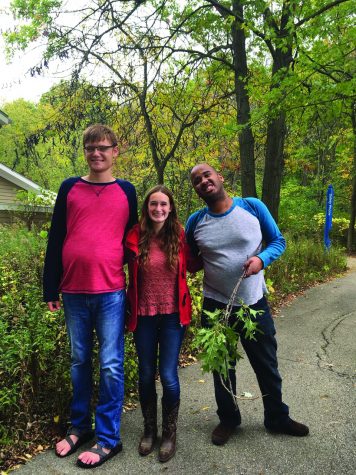
Students Chad Verkaik, Jessica Brand and Joshua Pittman
Each Calvin student mentor chooses to partner with the program, and quite a few of the mentors are in classes that the RFL students attend. Through this mentorship program mentors can develop a relationship with an RFL student, which can turn into a friendship and help the RFL student feel more connected to Calvin’s campus.
The implementation of the RFL Academy at Calvin College impacts not only RFL students but also other Calvin students and faculty members. The incorporation of RFL Academy at Calvin further exemplifies Calvin’s commitment to inclusivity and appreciation for every single person on campus.
RFL students have the ability to learn in the same environments and share similar college experiences as other Calvin students with or without disabilities. This inclusion is one of the main reasons RFL students love Calvin.
“I love how nice everyone is and how easy it is to get along with the other students on campus,” said Booza.
Pitman also stated that he enjoys that he “loves all of the people [at Calvin], gets to be with nice friends, and feels a part of the class.”
Upon completion of the program, RFL students will have learned various skills and gained valuable college experiences. Some impacts of the program include improved self-confidence, community awareness, communication skills, and independence, development of meaningful friendships with Calvin students and increased skill development.
Calvin’s participation in RFL Academy will continue to promote inclusivity of all students on campus, and seek to give us an example of vibrant community.



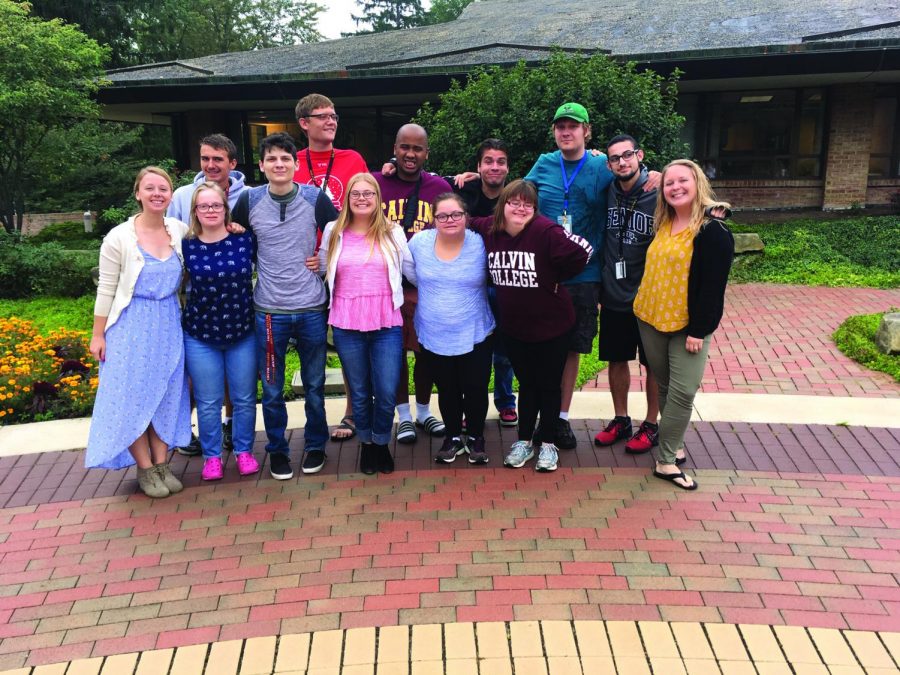



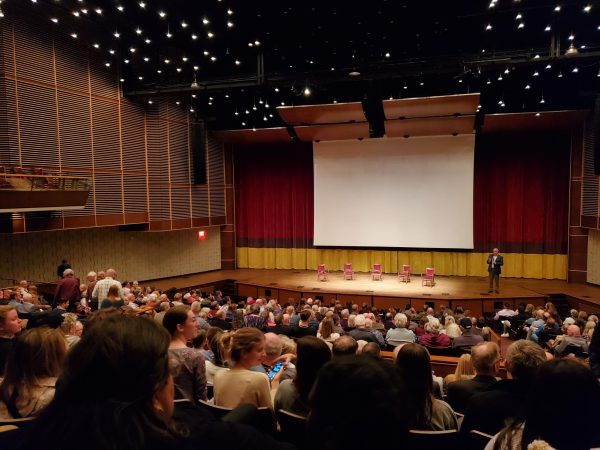
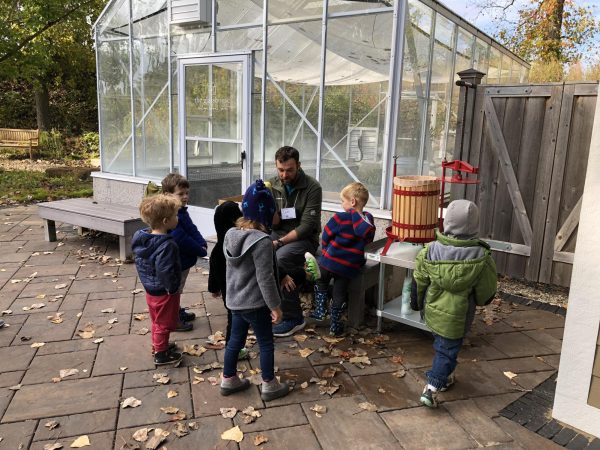
Phil Stegink • Oct 13, 2018 at 3:06 pm
A great article about a great program with great students and great instructors (I can probably insert a few more “greats” in my. comments.). The RFLA program is a great (there, another one) program for the Calvin community.